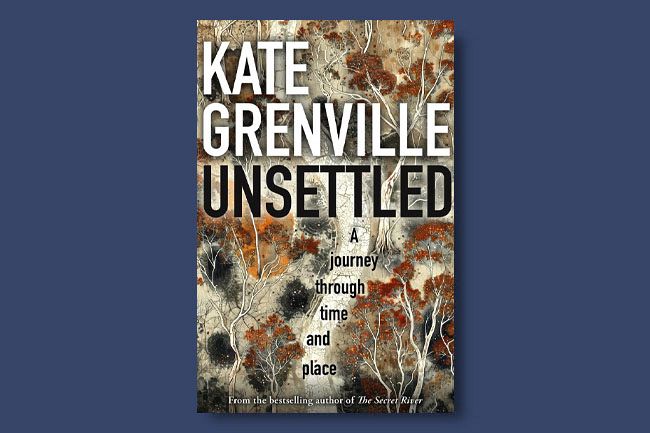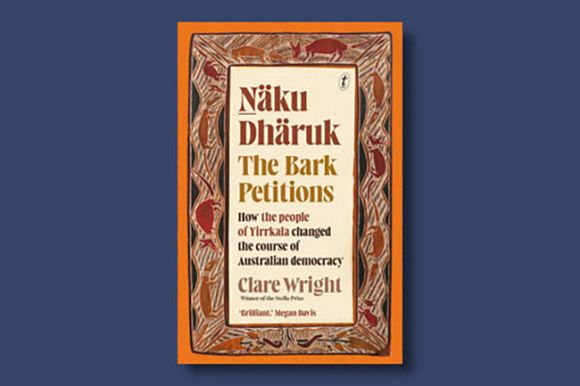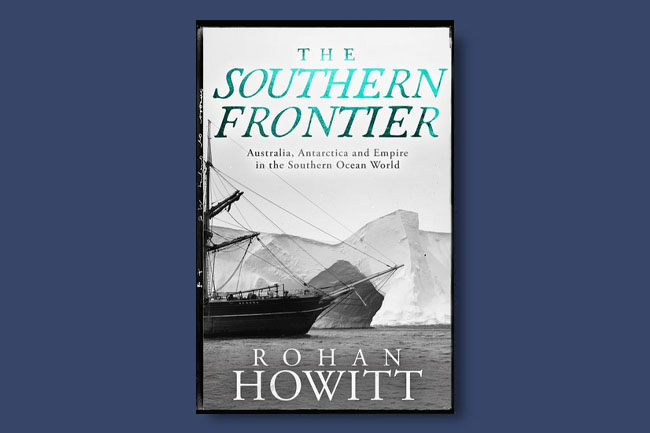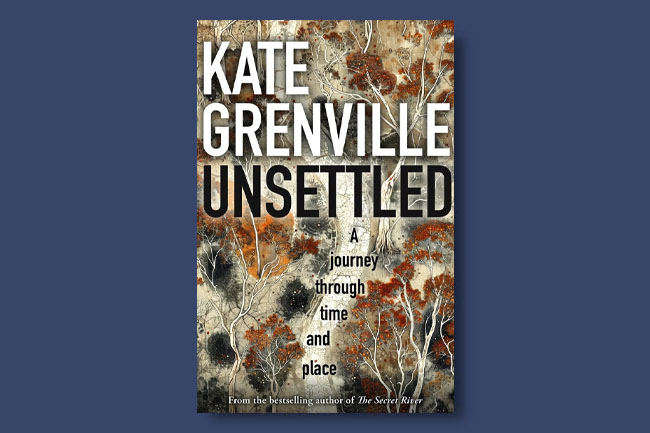Kate Grenville retraces her ancestors’ colonial paths across Australia, confronting the legacy of dispossession and exploring what it means to live on stolen land. Jim Kable reviews her new bestseller, Unsettled.
IN MAY 2022, I came across an article by journalist Steve Dow writing for The Guardian with specific reference to the Myall Creek Massacre of 10 June 1838 — a site lying north of Bingara towards Inverell in northern NSW.
Steve made mention of Kelvin Brown, a senior Gomeroi man with an involvement with the Myall Creek Massacre Memorial, a place I first visited around the year 2000 on a visit back from Japan, where I was then teaching. I knew the name Kelvin Brown — he’d been a student of mine at Macintyre High School in the mid-1970s. I searched online and found him interviewed by a women’s group. What a story he had to tell. And yes, it was “my” Kelvin.
I found a site for Kelvin and wrote him a letter of reconnection. And the following morning, a phone call came. Two hours went by in a flash. He was on the National Committee of the Myall Creek Massacre Memorial. “I’ll have to come up and visit you,” I said.
The annual gathering for the Myall Creek Massacre Memorial March was to coincide with the anniversary just a week or two later, led by Kelvin. Later, I saw photographs of many hundreds in attendance, when accommodation far and wide was booked out. But I was able to do so the following week when Kelvin indicated he would be free. And did so.
Kelvin is a direct paternal descendant of one of the Yirrayaraay Clan, some young men of which were working away when the rest of the clan was infamously and brutally massacred. Kelvin studied agriculture upon leaving school at Tooloogan Vale near Scone (it led to entry to Tocal College, though Kelvin did not take up that offering, instead, spending a tour of service in the Armed Forces and was later instrumental in setting up Armajun — the local area Indigenous Peoples’ health service).
Kelvin is now, as I write almost three years later, a Councillor of the Inverell Shire Council. Together, we visited the Memorial. It was a singularly moving day together, as he took me through his life story and the history linking him to the Anaiwan and Gomeroi/Gamilaraay people of this northern NSW region.
I have spoken to Kelvin (AKA Giilbin, as it would be pronounced in language) to seek permission to tell these parts of his story and that very recently, he was in Canberra for a meeting with the recently appointed (July 2024) Minister for Indigenous Affairs (taking over from retiring Linda Burney), Senator Malarndirri McCarthy.
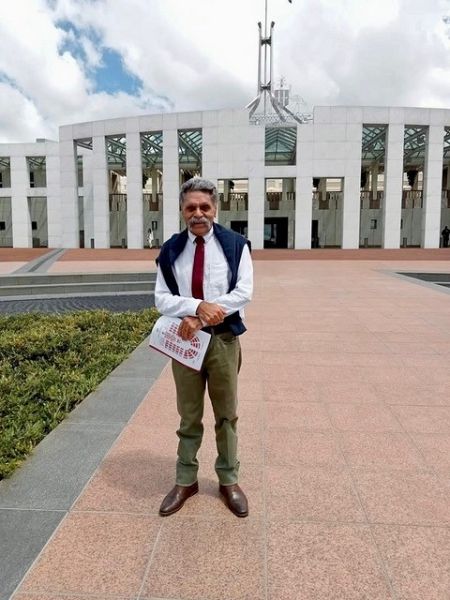
I have just read Kate Grenville’s Unsettled, a personal portrait of her search for the intersections of her family branches from her early convict ancestors (from Solomon Wiseman of Wisemans Ferry fame, about whom she wove a fictional novel, The Secret River, in 2005) as they moved north into the Upper Hunter, the Liverpool Plains and Goonoo Goonoo/Tamworth and on further to Uralla, Guyra and the Myall Creek area.
Unsettled reflects aspects of my own family story. I was born in Sydney on Cammeraygal land (RNSH) in 1949. From age two in Tamworth, most of it on Goonoo Goonoo Road, and later in the mid-1970s for a couple of years in Inverell, we frequently drove across Myall Creek and vaguely knew its story, mostly learned from a colleague, Susan Hausler. Though there was no Memorial in those days.
Hausler was a contemporary of mine, though educated at Macquarie University in Sydney – part of its first intake – and upon her appointment as a teacher of English and History to Warialda secondary school, decided to set a project for her history students researching local area history and the Myall Creek murders of 1838.
Hausler was, in effect, then promptly warned off by the then Principal Evan Francis. “You can’t do this!” he expostulated. But some 20 years later, she was working with a memorable class of students of high social intelligence, she told me recently, who lobbied the local Council that there should be a memorial.
Other friends in Inverell, John and Beth Moore, were also part of the same reconciliatory movement, descendants and “settler” backgrounds, aiming likewise. (A son-in-law to John and Beth is a descendant of the Suttor Family of “Brucedale” near Bathurst — part of the Windradyne story. Beth is a first cousin to film director Phillip Noyce.)
The reader of Unsettled will be unsettled or at least should be unsettled as they follow the travels leading north towards Myall Creek taken by Kate Grenville. The fragments of family stories handed down via the storyteller-guardians of family history – as she points out, the females of the family – are matched against other documented evidence.
Though Kate is no simple acceptor of these stories, she interrogates them thoroughly, looking from this angle or that particular phrasing, what might have been being covered up. What are the local present-day meanings ascribed to earlier times and the buildings which still exist, or exist in ruins? Or landscapes modified from First Peoples times by use of the “settlers” and their stock/agricultural pursuits?
Near the end of the book, Kate is in Guyra researching the story of her mother’s favourite brother, Frank Russell, whose ballot-winning of a property in the 1938 Closer Settlement Scheme at Green Hills sets this stage of the story.
It is worth quoting in full two of the paragraphs, illustrating how she highlights particular words and ways of phrasing to slyly draw the readers' attention to the sleight-of-hand of historical description:
It’s said that the explorer John Oxley was the first foreigner to see this part of the world, though he mightn’t have come this far north. In any case, by the 1830s the squatters had moved in. In the words of a local history, Alexander Campbell took up a stretch of land he called Guyra Station in 1835. In 1838 the Everett brothers founded Ollera Station to the west, and others settled to the east along the Gara River, on a big area the squatter called Green Hills. At that stage it was described as practically virgin land. Hmmm. Can you be practically a virgin? That practically doesn’t intend to, but it points to the fact that the land was being used and manipulated by Aboriginal people in ways that even the balanda could see.
At some point that big run called Green Hills became a pastoral lease. The lease changed hands a few times before being sold to the Government in 1936 — which was a bit of right-hand-not-knowing-what-the-left-hand-was-doing, since it was a lease and in theory the Government already owned it. The Government subdivided it into fourteen smaller blocks that were balloted to be sold.
‘Explorer’ is the word used to describe early foreigners seeking out new territories for exploitation, not new by any means to the local First Peoples who had been living on their country for tens of thousands of years. Squatters were those new arrivals with significant family connections back in the UK who arrived with lots of capital, who pushed beyond the legal limits of (land theft from First Peoples) official “settlement” and effectively squatted, operating on the (unethical) principle of possession being nine-tenths of the law. It gave rise to that land-holding class being described as the squattocracy.
‘Took up’ is pretty clearly judged by how one understands things today as theft, took possession of. No treaty or exchange with the First Peoples was involved, who were themselves sometimes benignly treated, at other times as in some of the 500 (at a minimum) massacres which occurred and for which documentary proof has been uncovered right around Australia.
‘Balanda’ is a word for non-Indigenous peoples deriving from a Macassan word corrupted from Hollander, which arrived with Macassan traders (from the 17th Century at least if not earlier) to the Yolŋu country of north-east Arnhem Land in the north-east of the Northern Territory.
This was the point at Green Hills where Kate’s uncle Frank came into the picture. He was there for only a year when he enlisted in 1939. He was sent to fight in Timor, became a prisoner of the Japanese and died on the Burma-Thai Railway.
Kate is in Guyra on the morning of the ANZAC Day Dawn Service and the little town's ANZAC Day March. Thinking of her uncle, whose name is on the little memorial to those who served/died, but beyond that, of all the wars in which Australia has served, the names of which shine in gold (Pozières, Tobruk, Long Tan). Those lists of names, too, on memorials set up in every major town and little village across Australia, such as Guyra.
Grenville muses on whether, alongside these memorials, usually the statue of a young soldier in puttees, there might also be one commemorating the other war, the one that happened right here at home, right around the frontiers as the invasion settlement pushed into all corners. If the names in gold were Myall Creek, Appin, Forrest River.
Grenville writes:
After so much damage it might not be possible to list the individual names of the dead, but there’d be some way to make sure the people who’d fought for their homeland were properly remembered. It’s difficult to imagine. Would there be another version of the Dawn Service on a day set aside to honour the dead, everyone coming together to walk down the main street? More reminders up in gold not to forget? And how would it feel to live in a country that could find it in itself to do that?
Unsettled by Kate Grenville is published by Black Inc Books.
This book was reviewed by an IA Book Club member. If you would like to receive free high-quality books and have your review published on IA, subscribe to receive your complimentary IA Book Club membership.
Jim Kable is a retired teacher who has taught in rural and metropolitan NSW, in Europe, and later, long-term in Japan. He is also a member of the steering committee of The New Liberals political party.
 This work is licensed under a Creative Commons Attribution-NonCommercial-NoDerivs 3.0 Australia License
This work is licensed under a Creative Commons Attribution-NonCommercial-NoDerivs 3.0 Australia License
Support independent journalism Subscribe to IA.



